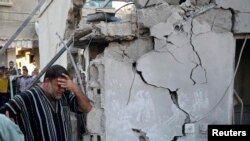Among the casualties of the latest Gaza war were nine relatives of a journalist colleague of mine, Asmaa al-Ghoul. They died Sunday, just a day before Israel and Hamas finally accepted a three-day truce.
Two missiles fired by a U.S.-supplied Israeli F-16 collapsed their one-story house in the Rafah refugee camp, killing Asmaa’s uncle, Ismail, his wife, Khadra, their two sons, Wael and Mohammed, their two daughters, Hanadi and Asmaa, and Wael’s three children, Ismail, Malik and Mustafa, the last only 24 days old. According to my colleague, none of them were members of Hamas or any other Palestinian political faction.
It is easy to be cynical about this latest orgy of Middle Eastern violence. Why single out nine deaths when more than 1,800 other Palestinians – and more than 60 Israelis – also died in the last month, and scores of noncombatants are still perishing every day in Syria, Iraq and Libya?
Yet this Gaza war – the third in six years – could have a broader meaning and not just lead to another short period of relative calm followed by a new conflagration.
There are major dangers for Israel in continuing a lopsided conflict that dehumanizes Palestinians, distorts Israeli democracy and alienates even traditional friends. A collective online gasp greeted the blog post of an Israeli writer, Yochanan Gordon, who actually suggested that “genocide” of Palestinians was a possible solution to the conflict. Meanwhile, Nazi swastikas are popping up with increasing frequency in Europe.
While the U.S. Congress, in one of its last acts before going off on a month-long vacation, dutifully approved an extra $225 million for Israel’s “Iron Dome” anti-missile system that protected most Israelis from Hamas rockets, a poll taken by a pro-Israel group of young Congressional staffers showed waning support for the actions of the Jewish state. Other polls have shown that only a quarter of Americans aged 18 to 29 backed Israel in this Gaza conflict.
If Israel is to avoid further de-legitimization, it should begin a new and more sincere effort to reach a peace agreement with Hamas’s political rival, the Palestinian Authority (PA). Salam Fayyad, the respected former Palestinian finance and prime minister, suggested in a speech in Washington last week that the two sides actually set a date for the Israeli occupation to end and work backwards from there.
As radical and unrealistic as that might sound, “a date certain” for the end of occupation, as Fayyad put it, would push Israel and the PA to finally reach understandings about territory and security that have so far eluded them despite intensive U.S. mediation.
A first step would be to solidify the latest cease-fire by transferring as much responsibility as possible for Gaza back to the PA under the leadership of President Mahmoud Abbas. Egypt, now ruled by a tough, anti-Hamas government, is in favor of the PA taking over security at the Rafah checkpoint. Egypt can provide additional assurances to Israel that it will not permit Hamas to smuggle in materials to rearm.
The Israelis should recognize the technocratic unity government created by the PA and Hamas before the latest fighting and resume financial aid to the West Bank. With Abbas on top of this arrangement, the PA can expand its presence in Gaza and seek to prolong the cease-fire. That would enable international organizations and other foreign donors to begin providing the resources needed to rebuild Gaza’s shattered infrastructure, including homes for more than 200,000 people displaced by the fighting.
Fayyad also suggested further broadening the political base of the PA by reviving something called the Unified Leadership Framework, which includes all the factions of the old Palestine Liberation Organization. This would be a prelude, he said, to parliamentary and presidential elections, which are long overdue.
The Barack Obama administration also needs to play a role in brokering a longer-lasting cease-fire and ultimately a political solution, despite the hard knocks it has taken from Israel for its efforts over the past month.
The F-16s that killed Asmaa al-Ghoul’s relatives were supplied by the United States along with other military hardware worth more than $3 billion a year. It is not enough for the State Department to condemn Israel’s killing of civilians as “disgraceful” – as it did a few days ago when Israeli rockets killed 10 people at a U.N. school sheltering displaced Palestinians. Obama should do more than just have the State Department press office shake a rhetorical fist; he should table a U.S. framework for a comprehensive peace agreement.
There are many doubts about whether Israeli Prime Minister Benjamin Netanyahu has the desire and courage to conclude an agreement. But to paraphrase former U.S. Defense Secretary Donald Rumsfeld, you make peace with the leaders you have, not the ones you wish you had. The U.S. has the leverage to prod Netanyahu back to the negotiating table. Obama cannot run for re-election and after this fall’s midterms, has nothing to lose in domestic politics by standing up to Israel. Netanyahu, already Israel’s longest serving prime minister, should be thinking about his legacy, too.
The regional environment also offers possibilities. Two major Arab states – Saudi Arabia and Egypt – support Abbas and are eager to further isolate Hamas, an offshoot of the Muslim Brotherhood that both have banned. Syria and Lebanon – and Iran’s ally, Hezbollah – are preoccupied with sectarian battles; Iran is more worried about Iraq and Syria than shoring up Hamas. Israel should take advantage of this period while it lasts.
Asmaa Al-Ghoul writes in her tribute to her slain relatives, “Never ask me about peace again.” But given the alternatives, a better question is: How can you not seek peace again?





